|
|
|
Sort Order |
|
|
|
Items / Page
|
|
|
|
|
|
|
| Srl | Item |
| 1 |
ID:
142834
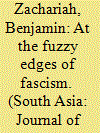

|
|
|
|
|
| Summary/Abstract |
The genealogies of völkisch ideas everywhere would suggest that they were relatively widespread in a world thinking about defining the nature of nationalism. The idea of the Volk has its origins, of course, in German romanticist imaginings of the German nation. The glorification of an ‘Aryan’ past in India, the identification of the ‘folk element’, or a connection with sacred soil and sacred space, shared the same building blocks of romantic nationalism that were evident across the world. This essay focuses on Indian völkisch nationalism through the work and career of Benoy Kumar Sarkar, his engagements with German and Indian ideas, his ability to translate them across their specific contexts and his institutional linkages.
|
|
|
|
|
|
|
|
|
|
|
|
|
|
|
|
| 2 |
ID:
142828
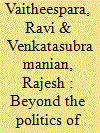

|
|
|
|
|
| Summary/Abstract |
Wedged uncomfortably between the gathering pan-Indian nationalist movement and the locally resonant and divisive anti-Brahman, Tamil ethno-nationalist movement, Left leaders in the Tamil region in India were faced with a difficult and complex set of political choices and challenges in the early twentieth century. These political challenges brought to the fore the social and political contradictions between an anti-colonial Indian nationalism led mostly by upper-caste liberal–bourgeois leaders and an equally entrenched and locally resonant ethno-nationalist movement which, despite its social reformist and anti-Brahman platform, was led by dominant non-Brahman caste leaders committed to the continuation of British rule. In this paper, we will be looking at two of the most prominent Tamil Left leaders who attempted to work with and bridge these contradictory movements in Tamil society. M. Singaravelu (1860–1946) and P. Jeevanandam (1907–63) were prominent Left leaders and intellectuals in the Tamil region and were well known for their close engagement with and sensitivity to issues of social reform, caste and linguistic and cultural hegemony. Both joined various political movements including the Indian National Congress, the Dravidian movement and the Indian communist party in different phases of their careers. It is their participation and engagement with such diverse and contradictory movements that make their intellectual interventions unique and a close study of their work valuable for providing a window into how the Left attempted to deal with such thorny issues as the politics of caste and language in India.
|
|
|
|
|
|
|
|
|
|
|
|
|
|
|
|
| 3 |
ID:
142839
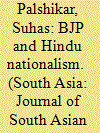

|
|
|
|
|
| Summary/Abstract |
Will the BJP pursue its Hindutva ideology while in power or will it now gradually become a ‘centrist’ party? Responding to this question, the present paper argues that the possibility that it would transform into a centrist party is rather dim for four reasons: 1) the mixing of Hindutva identity with the development agenda during the national election campaign in 2014; 2) the mild and covert pursuit of Hindutva by both party and government; 3) the dynamic, but deep-rooted relationship between Hindutva and the BJP; and 4) most importantly, the slow and imperceptible shifting of the middle ground of public opinion in India in favour of majoritarian (and therefore pro-Hindutva) sentiment.
|
|
|
|
|
|
|
|
|
|
|
|
|
|
|
|
| 4 |
ID:
142835
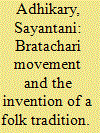

|
|
|
|
|
| Summary/Abstract |
The Bratachari movement, officially inaugurated in 1934, was shaped by the bodily anxieties of educated middle-class Bengalis and aimed at the all-round development of the body, mind and soul through the invention of a specific tradition. Though the founder of the movement, Gurusaday Dutt, attempted to construct a ‘martial’ genealogy for the ‘effeminate’ Bengalis through adequately ‘masculine’, ‘indigenous’ folk dance forms, the ideology around which the movement was built was not entirely ‘indigenous’. Indeed, it seemed to borrow from the English agenda of the revival of folk traditions and the German idea of Volksgeist to a large extent.
|
|
|
|
|
|
|
|
|
|
|
|
|
|
|
|
| 5 |
ID:
142844
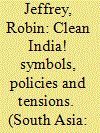

|
|
|
|
|
| Summary/Abstract |
This essay assesses the Swachh Bharat! or Clean India! campaign of Prime Minister Narendra Modi's government. The essay identifies the immense scope of the task—to create a ‘clean India’ by 2019—the pressures that make improved public sanitation urgent and the prime minister's experience in the state of Gujarat that may encourage him to believe that achievements are possible. The essay gauges the political risks and benefits for a prime minister noted for his media proficiency and keen sense of symbolism.
|
|
|
|
|
|
|
|
|
|
|
|
|
|
|
|
| 6 |
ID:
142833
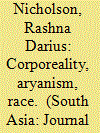

|
|
|
|
|
| Summary/Abstract |
Recent scholarship has problematised the ‘impact-response’ theory that ideas such as Aryanism, eugenics and militarism were merely imported from a European context into a South Asian one. This paper delineates a longer trajectory of the relationship between corporeal language and communal identity through a focus on the Parsi community of western India. As early as 1853, reformist Parsis enacted modes of ancient Kayānī virility in the gymnasium and theatre to redefine notions of communal identity that drew simultaneously from Enlightenment precepts and a mythic Aryan heritage discovered by Orientalists. Subsequently, the confluence of a loss of numerical, financial and political strength, and the popularisation of the ideas of Darwin and Mendel, prompted a shift in ethnic and semantic thinking, whereby the language of corporeality was co-opted by the orthodox faction to justify the bifurcation of religion and race. Consequently, Parsis, in the midst of a rising Hindu nationalist movement, called not only for the revival of Persian epic theatre, a Parsi militia, the exclusion of ‘half-castes’ from the community and the castration of ‘mentally defective’ community members, but also for a renewal of ties to Iran and a separate state of Parsistan.
|
|
|
|
|
|
|
|
|
|
|
|
|
|
|
|
| 7 |
ID:
142829
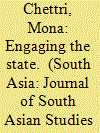

|
|
|
|
|
| Summary/Abstract |
In the eastern Himalayan borderland, state-led initiatives have led to the transformation of pre-existing patronage networks and placed ethnic identity at the core of regional politics. Based on ethnographic research in Sikkim, the paper illustrates the prolific rise of affirmative action politics and its relationship with ethnic identity, which has altered the social, political and religious landscape of Sikkim. The paper introduces a new approach to understanding borderlands as dynamic political spaces and contributes to a nuanced understanding of emerging forms of political agency and interaction on the peripheries of regional South Asia.
|
|
|
|
|
|
|
|
|
|
|
|
|
|
|
|
| 8 |
ID:
142837
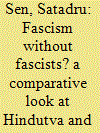

|
|
|
|
|
| Summary/Abstract |
This essay examines some aspects of Hindutva and Zionism, taking a comparative approach that underlines the ubiquity—i.e. the comparability—of fascisms in the articulation of modernity. It focuses on the imaginary of race, place and peoplehood in each ideology, the roles of majorities and minorities in the formulation of national well-being, and possible exit strategies from violently exclusivist statecraft. It explores, also, an intellectual prehistory in which Indian nationalists cultivated a fascination with Jews and Zionism as part of their understanding of a race constituted by historical damage and the imperative of repair. It argues, first, that the comparative study of fascisms is not only valid, but necessary to the politics of democracy. Second, it argues that because Indian fascism is less racialised than the Israeli version, it is more open to contestation and mitigation by the deployment of alternative imaginaries of ethnicity and nationhood.
|
|
|
|
|
|
|
|
|
|
|
|
|
|
|
|
| 9 |
ID:
142832
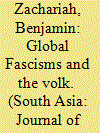

|
|
|
| 10 |
ID:
142838
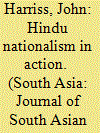

|
|
|
| 11 |
ID:
142842
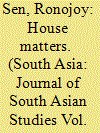

|
|
|
|
|
| Summary/Abstract |
While the Bharatiya Janata Party (BJP) alone enjoys a majority in the current Lok Sabha (lower house of parliament), it lacks numbers in the Rajya Sabha (upper house). This paper examines how the opposition mobilised, especially in the Rajya Sabha, to counter some of the Modi government's legislative agenda during its first year, and the government's response of promulgating ordinances. A particular focus is on the issue of amending the 2013 land acquisition legislation passed by the previous Congress-led United Progressive Alliance. The paper also considers Modi's speeches inside and outside parliament. His articulation of the government's agenda, particularly on land acquisition, and his views on the role of the opposition are analysed. The paper makes two broad arguments. First, the Rajya Sabha was possibly reclaiming some of its functions, as envisioned by India's Constituent Assembly, in bringing a ‘balance’ to legislative decision-making. India's political evolution, from a one-party dominant system to one with several strong regional parties, has meant a changed role for the Rajya Sabha. Second, in its parliamentary discourse, Modi and the BJP were caught in the contradictory positions of battling the perception that they were too close to corporate interests, even as they attempted to project an inclusive and pro-poor image.
|
|
|
|
|
|
|
|
|
|
|
|
|
|
|
|
| 12 |
ID:
142830
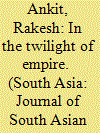

|
|
|
|
|
| Summary/Abstract |
This article focuses on Indo-British interactions at the United Nations during 1945–47, a significant and hitherto overlooked episode of India's transition within the British Commonwealth from a colony to a dominion. In this twilight period of the British Raj, India sent its first delegations onto the international stage—forays that were critically received by London and subsequently employed to anticipate New Delhi's global role in post-1945 international affairs. The delegations' delicate composition, combative activities and difficult interactions with their British counterparts established the diplomatic implications of decolonisation for London. The focus of existing literature on India's international identity at this time has been on the formulation of Jawaharlal Nehru's non-aligned approach to the Cold War. This article, instead, concentrates on its presentation and reception. Secondly, the story of India's presence at the UN usually begins with the Korean War (1950–53). This article shows that in fact it was in 1946–47 that the first impressions of the country's independent foreign policy were given by an interim Indian government. Based on the papers of Frederick Puckle, advisor on Indian affairs at the British Embassy in Washington (1943–47) and of Vijayalakshmi Pandit, leader of India's UN delegation, and supplemented by relevant official records, oral histories and memoirs, the article presents an unheralded facet of India's emerging independent identity in this period of pre-Independence.
|
|
|
|
|
|
|
|
|
|
|
|
|
|
|
|
| 13 |
ID:
142831
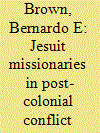

|
|
|
|
|
| Summary/Abstract |
In August 1990, Father Eugene John Hebert SJ disappeared while trying to reach his home in the Sri Lankan city of Batticaloa. Caught in the midst of the turmoil that confronted Tamil and Muslim minorities after the peace-keeping operations led by the Indian armed forces collapsed, Father Hebert was one of thousands of victims who perished in the violence that engulfed the Eastern Province of Sri Lanka between June and September 1990. Since the early stages of the ethnic conflict (1983–2009), American Jesuits stationed in Tamil-speaking areas of the island had become de facto human rights activists, being virtually the only remaining trusted mediators between the different factions involved in the armed confrontation. Their efforts to foster peace and dialogue in the region were far from their original assignment as educators—which Father Hebert had been conducting since his arrival in 1948. This article not only traces Father Hebert's life trajectory from Louisiana to Sri Lanka, it also reflects on the cultural impact that the presence of American Jesuits had in the entire region, as well as on the changing responsibilities they assumed in the volatile political context of the island that took them from coaching basketball to becoming catalysts for peace.
|
|
|
|
|
|
|
|
|
|
|
|
|
|
|
|
| 14 |
ID:
142841
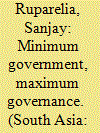

|
|
|
|
|
| Summary/Abstract |
This article examines the politics of development during the first year of the new Modi government. In particular, it explores the meaning of its guiding maxim, ‘Minimum Government, Maximum Governance’, by analysing specific reforms and broader changes in state–society relations. First, the Modi government has imposed greater discipline in public administration through a personalistic, centralised and technocratic style of rule. But it has bolstered executive power by limiting political transparency, parliamentary government and social dissent. Second, the new government has promoted urbanisation, manufacturing and infrastructure through greater economic liberalisation, public investment and institutional reform. Yet it has weakened many labour protocols, environmental regulations and participatory mechanisms regarding land acquisition and forest conservation. Lastly, the Modi administration has introduced new insurance schemes and championed digitally-enabled cash transfers to deliver social entitlements. However, it has reduced public spending on primary education and basic health, and undercut many rights-based welfare acts introduced by the previous administration, the United Progressive Alliance (UPA). These three trends have narrowed the spaces of power and contestation in contemporary Indian democracy, frustrating the promise of ‘maximum governance’.
|
|
|
|
|
|
|
|
|
|
|
|
|
|
|
|
| 15 |
ID:
142843


|
|
|
|
|
| Summary/Abstract |
On 1 January 2015, India's 64-year-old apex policy-making body, the Planning Commission, was replaced by a new institution, the National Institution for Transforming India (NITI) Aayog. While it is still too early to assess the NITI Aayog's impact on India's complex policy landscape, or the full extent of its social and political implications, the emerging architecture of the new institution provides valuable insights into the Modi government's economic policy priorities and preferred style of governance. My paper argues that, contrary to the government's claims that the NITI Aayog will spur innovative thinking by objective ‘experts’ and promote ‘co-operative federalism’ by enhancing the voice and influence of the states, the new institution is being crafted to enlarge the power of the executive government and the prime minister. The elimination of the Planning Commission, a once-powerful advocate of public investment-led development, and of the National Development Council, an important platform for states to work together towards common goals, has set the stage for what the NITI Aayog will turn out to be. Developments to watch for include the NITI Aayog's role in diminishing horizontal institutional accountability; in reducing the ability of state governments to negotiate with the central government; and in narrowing intellectual diversity within elite policy circles.
|
|
|
|
|
|
|
|
|
|
|
|
|
|
|
|
| 16 |
ID:
142836
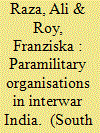

|
|
|
|
|
| Summary/Abstract |
This paper examines the emergence of paramilitary and volunteer movements in interwar British India. These organisations emerged largely in response to the political climate in India as well as developments elsewhere around the globe. The most notable amongst these was the emergence of fascism in Europe. We examine the politics and ideas of these organisations through two case studies: the Hindustani Seva Dal and the Khaksar Tehreek. Notwithstanding the many differences between the two, both groups were profoundly influenced by a broader fascist moment. In doing so, they embodied certain aspirations and anxieties that were characteristic of the interwar era. Through these case studies, then, we hope to provide some insights into a frequently overlooked aspect of the interwar period in British India.
|
|
|
|
|
|
|
|
|
|
|
|
|
|
|
|
| 17 |
ID:
142840
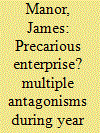

|
|
|
|
|
| Summary/Abstract |
During its first year in power (2014–15), the government of Narendra Modi in India showed itself to be a precarious enterprise. The prime minister was beset by multiple antagonisms. He radically centralised power. This has enabled him to get some things done swiftly, but it has weakened him by choking off reliable information flows from below and by sowing discontent among his party and his supporters. An exercise in fiscal decentralisation to the state level in this federal system ran counter to his centralisation, but on close examination, it proved less than generous. His efforts to tackle two problems—bureaucratic paralysis and high-level corruption—contradicted one another. His efforts to transcend the ambiguities which ensnare every prime minister were unrealistic and triggered further discontent among party colleagues. Finally, his handling of religious polarisation became entangled in multiple antagonisms—between the expectations of Hindu nationalists (and his own legacy as a polariser) and his duty to maintain social cohesion; between political gains to be made from polarisation and political costs that attend it; between polarisers who sought to strengthen his hand and those who sought to polarise in order to undermine him.
|
|
|
|
|
|
|
|
|
|
|
|
|
|
|
|
| 18 |
ID:
142845
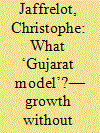

|
|
|
|
|
| Summary/Abstract |
As chief minister of Gujarat, Narendra Modi claimed that his state was a ‘model’ of development. While his government achieved a remarkable growth rate, his public policies as well as his politics have been on par with growing inequalities. The collaboration between the state and the corporate sector—an old tradition in Gujarat—gained momentum under Modi, businessmen benefitting from low wages, acquiring land more quickly and at a better price, and obtaining more tax breaks, etc. Simultaneously, Gujarat spent less than most of the other states of India on education and health. Even though the ‘Gujarat model’ cultivates social polarisation, Narendra Modi was able to win elections three times in the state for two major reasons. First, the main casualties of this political economy have been Muslims, Dalits and Adivasis, who do not represent more than 30 percent of society. Second, the beneficiaries of this ‘model’ were not only the middle class, but also a ‘neo-middle class’ made up of those who have begun to be part of the urban economy or who hope to benefit from it—the ‘neo-middle class’ is primarily aspirational. These groups were numerous enough to allow Modi's BJP to win successive elections in Gujarat. The BJP got more than 50 percent of the votes only once, in 2002, but the main party can get an absolute majority with less in a first-past-the-post system. While the BJP is known for its expertise in religious polarisation, this is clearly a case of social polarisation in which the ethno-religious identity quest of the middle and neo-middle classes continues to play a role.
|
|
|
|
|
|
|
|
|
|
|
|
|
|
|
|
|
|
|
|
|